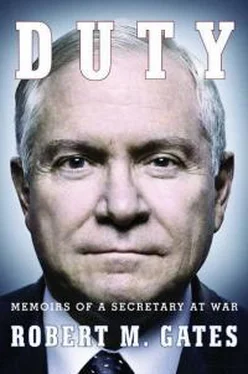I held a press conference at Walter Reed, during which I said I was dismayed to learn that some of our injured troops were not getting the best possible treatment at all stages of their recovery, especially in their outpatient care. “This is unacceptable, and it will not continue,” I said. In a departure for a senior government official, I also said, “I am grateful to reporters for bringing this problem to our attention, but very disappointed we did not identify it ourselves.” Speaking of our wounded warriors, I asserted, “They should not have to recuperate in substandard housing, nor should they be expected to tackle mountains of paperwork and bureaucratic processes during this difficult time for themselves and their families. They battled our foreign enemies; they should not have to battle American bureaucracy.” I made clear that the problem was not about world-class medical care but about outpatient facilities and administration. I then named the members of the review group and said they were empowered to inspect circumstances not only at Walter Reed but at Bethesda National Naval Medical Center in Maryland and at any other centers they chose to examine. I expressed my “strong belief that an organization with the enormous responsibilities of the Department of Defense must live by [the] principle of accountability at all levels. Accordingly, after the facts are established, those responsible for allowing this unacceptable situation to develop will indeed be held accountable.” I later noted that several of those officers and NCOs most directly involved had already been relieved by the Army, and that “others up the chain of command were being evaluated.”
Senior Army officers responded in different ways. The vice chief of staff, General Dick Cody, said, “We were absolutely disappointed in the status of the rooms and found the delays and lack of attention to detail to the building’s repairs inexcusable.” From that day forward, Cody made the problems of our wounded warriors his highest priority, and with his leadership, the Army began to move in the right direction. Unfortunately, there were others who were defensive and seemed to downplay the problem. The Army’s top medical officer, Lieutenant General Kevin Kiley, called the newspaper reports a “one-sided representation” and seemed to question the tone rather than the facts. His response set my teeth on edge, but not nearly as much as comments from Secretary of the Army Fran Harvey, who was quoted as saying, “We had some NCOs who weren’t doing their job, period.” To blame the widespread outpatient problems at Walter Reed on “some NCOs” was, in my view, unconscionable.
I wanted change at Walter Reed, and under pressure from me, the Army’s first step, on March 1, was to relieve the hospital commander, Major General George Weightman. Weightman had been in the job only about six months but accepted the action with dignity. He publicly acknowledged the problems and apologized to the families. Secretary Harvey then made what was, in my opinion, a huge mistake. He appointed Kiley as temporary hospital commander. In our own examination of the situation during the preceding days and in congressional hearings that week, it became pretty clear that Kiley had been informed of the problems at Walter Reed and that some of them could be traced back to his command there. His appointment was greeted with dismay by many wounded warriors and their families. He had not acted to remedy the situation, and his public comments continued to seem to downplay it. Indeed, Harvey recounted to the press a call he had received from Kiley criticizing the Post series and saying, “I’m willing to defend myself.… I want to have an opportunity to defend myself, and it was wrong and it was yellow journalism at its worst, and I plan on doing it. Trust me.” Kiley’s appointment, on top of Harvey’s placing blame on a few NCOs, confirmed to me that the secretary of the Army did not understand the magnitude of the problem and could not lead the effort to fix it. On March 2, after talking with the president, I called in Harvey and asked for his resignation, saying Kiley’s appointment was the last straw. He was stunned and clearly felt he was being thrown under the bus to placate the media and Congress. I received his letter of resignation that afternoon. Fran Harvey was a good man who had rendered distinguished service to the country. I fired him because once informed of the circumstances at Walter Reed, he did not take the problem seriously enough. I said the same thing to reporters.
I held a press conference on March 3 to announce that I had directed the Army—Pete Geren would be acting secretary—to appoint a new commander at Walter Reed that same day, rescinding the Kiley appointment. I went on to say, “I am disappointed that some in the Army have not adequately appreciated the seriousness of the situation pertaining to outpatient care at Walter Reed. Some have shown too much defensiveness and have not shown enough focus on digging into and addressing the problems. Also, I am concerned that some do not properly understand the need to clearly communicate to the wounded and their families that we have no higher priority than their care, and that addressing their concerns about the quality of their outpatient experience is critically important.” I reaffirmed my full confidence in the Walter Reed doctors, nurses, and staff, who I said were “among the best, and most caring, in the world.”
At my suggestion, the president appointed a bipartisan commission to examine the full range of treatment of wounded warriors by the Departments of Defense and of Veterans Affairs. He appointed former Senate majority leader Bob Dole, a wounded warrior himself from World War II, and former secretary of health and human services Donna Shalala to cochair the commission. At George Casey’s suggestion, I urged the president to include in the membership of the panel a young wounded warrior and the widow of one of our fallen.
At my senior staff meeting on March 5, I went back to the comments I had made on my first day, December 18, and again to the senior civilian and military leaders in mid-January. I repeated that when Congress or the press makes an accusation, we need to look into it and not be defensive. Further, I said I would not allow junior or midgrade officers and NCOs to be fall guys for systemic problems. “Your antennae need to be up for other issues, such as equipping the troops.” I went on to speculate that the Department of Veterans Affairs likely had many problems if Walter Reed had the problems it did. I told the staff that the idea of a White House commission to look at the entire wounded warrior problem had been mine, and I expected full cooperation. I reiterated that acute care at Walter Reed was the best in the world, and that the problem was outpatient care. “The easiest thing in the world to fix is the facility; the biggest issues are bureaucracy and resources,” I said. “However, we will ensure it is not a resource issue. We’ll get the resources.”
There was still one loose end, Lieutenant General Kiley. I told my assistant Rangel on March 6 that I wanted General Cody, Major General Eric Schoomaker (the new commander at Walter Reed), the chairman of the Joint Chiefs, and Acting Secretary Geren to talk about Kiley’s future. I said that it needed to be an Army decision, but I did not feel he was helping the Army. Kiley retired soon thereafter.
I sent a message on March 9 to every American serviceman and woman all over the world informing them of my reaction to the situation at Walter Reed, describing the remedial actions being taken, and pledging to them that, “other than the wars themselves, I have no higher priority than taking care of our wounded warriors.”
The outpatient problem at Walter Reed was just the most visible of our shortcomings and failures in taking care of our wounded and their families. Because no one had expected a long war or so many wounded, no one had planned for or allocated the necessary resources in terms of caseworkers, established facilities on posts and bases to care for the wounded, fixed the bureaucratic abyss between the Departments of Defense and Veterans Affairs, and so much more. At my first cabinet meeting, the secretary of veterans affairs had introduced himself, and I offered him any and all assistance, knowing that his department had to have been pushed to the wall with all the seriously wounded veterans coming into its system as a result of two wars. I was staggered when he said his department was in good shape and had no problems. I’d been around long enough to know that when the head of a cabinet department says his organization has no problems, he is either lying or delusional. I knew the secretary wasn’t a liar. The scandal at Walter Reed was caused by a failure of leadership, but the awful outpatient conditions there were also a product of budget and personnel cuts, an unwillingness to invest money in a hospital complex that was slated for closure, and outsourcing to contractors. As I had foreshadowed to my staff, fixing the bureaucratic problems would prove a lot harder than getting adequate resources.
Читать дальше












